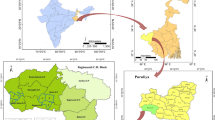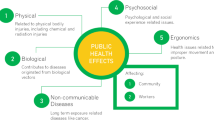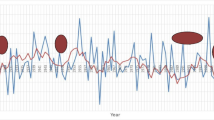Abstract
The study examined the awareness of farmers, vegetable traders, and consumers on the health risk reduction measures when using low-quality water in irrigated agriculture, and identifies farmers’ perceptions of the effectiveness of the health risk reduction measures. Data collection methods included a questionnaire survey with 60 farmers, 60 vegetable traders, and 70 consumers and four focus group discussions. General results show a low level of awareness of the health risk reduction measures in using low-quality irrigation water in all respondents’ categories. However, health protection measures such as health education, treatment of wastewater, washing low-quality water-irrigated vegetables with tap water, and the use of gloves while in the field were the most acknowledged measures, while crop restriction and cessation of irrigation before harvesting were among the less-recognized measures. No association was found between farmers’ socio-demographic characteristics and the mean awareness score of risk reduction measures, while a significant association was found between consumers’ study location (p < 0.05) and vegetable traders’ education level (p < 0.05). A statistical significant association was also found between farmers’ perception of the effectiveness of the health risk reduction measures and their study location. In such, wastewater farmers perceive the health risk reduction measures were very effective in reducing health risks compared to polluted river water farmers. This study suggests that health education targeting at specific exposed group and their social-demographic characteristics is the potential measure in raising awareness of the potential health risk reduction measures when using low-quality irrigation water in irrigated agriculture.

Similar content being viewed by others
References
Alhumoud JM, Behbehani HS, Abdullah TH (2003) Wastewater reuse practices in Kuwait. Environmentalist 23:117–126. doi:10.1023/A:1024831503569
Amoah P, Keraita B, Akple M, Drechsel P, Abaidoo RC, Konradsen F (2011) Low-cost options for reducing consumer health risks from farm to fork where crops are irrigated with polluted water in West Africa Philip. IWMI International Water Management Institute, Colombo
Blumenthal UJ, Peasey A (2002) Critical review of epidemiological evidence of the health effects of wastewater and excreta use in agriculture. World Health Organization, Geneva, p 35. http://www.who.int/water_sanitation_health/wastewater/whocriticalrev.pdf
Carr R (2005) Who guidelines for safe wastewater use—more than just numbers. Irrig Drain 54:S103–S111. doi:10.1002/ird.190
Carr R, Strauss M (2001) Excreta-related infections and the role of sanitation in the control of transmission. In: Fewtrell L, Bartram J (eds) Water quality: standards and health. IWA Publishing, London, pp 89–113
Choi J, Lee A, Ok C (2013) The effects of consumers’ perceived risk and benefit on attitude and behavioral intention: a study of street food. J Travel Tour Mark 30(3):222–237
Jimenez B (2011) Wastewater use in agriculture: public health considerations. In: Trimble SW (ed) Encyclopedia of water science, 2nd edn. Taylor and Francis, New York. doi:10.1081/E-EWS2-120043283
Jiménez B (2006) Irrigation in developing countries using wastewater. Int Rev Environ Strateg 6(2):229–250
Keraita B, Drechsel P, Konradsen F (2008) Perceptions of farmers on health risks and risk reduction measures in wastewater-irrigated urban vegetable farming in Ghana. J Risk Res 11(8):1047–1061
Keraita B, Konradsen F, Drechsel P (2010) Farm-based measures for reducing microbiological health risks for consumers from informal wastewater-irrigated agriculture. In: Drechsel P, Scott CA, Raschid-Sally L, Redwood M, Bahri A (eds) Wastewater irrigation and health—assessing and mitigating risk in low-income countries. Earthscan with International Development Research Centre (IDRC) and International Water Management Institute (IWMI), London, pp 189–207
Kihila J, Mtei KM, Njau KN (2014) Wastewater treatment for reuse in urban agriculture; the case of Moshi. Phys Chem Earth 72–75:104–110. doi:10.1016/j.pce.2014.10.004
Kilobe BM, Mdegela R, Mtambo MM (2013) Acceptability of wastewater resource and its Impact on crop production in Tanzania: the case of Dodoma, Morogoro and Mvomero wastewater stabilization ponds. Kivukoni J 1(2):94–103
Lagerkvist CJ, Hess S, Okello J, Hansson H, Karanja N (2013) Food health risk perceptions among consumers, farmers, and traders of leafy vegetables in Nairobi. Food Policy 38:92–104. doi:10.1016/j.foodpol.2012.11.001
Lamnisos D, Anastasiou C, Grafias P, Panayi A, Larkou A, Georgiou E, Middleton N (2013) Awareness, attitudes towards wastewater reuse and perceptions of public health risks among the general public in Cyprus. Eur J Public Health 23(Suppl 1):151–152
Lindell MK, Perry RW (2003) Communicating environmental risk in multiethnic communities, vol 7. Sage Publications, London
Martijn E, Redwood M (2005) Wastewater irrigation in developing countries—limitations for farmers to adopt appropriate practices. Irrig Drain 70:63–70. doi:10.1002/ird.186/abstract
Mayilla W, Keraita B, Ngowi H, Konradsen F, Magayane F (2015) Perceptions of using low-quality irrigation water in vegetable production in Morogoro. Environ Dev Sustain, Tanzania. doi:10.1007/s10668-015-9730-2
Owusu V, Bakang JEA, Abaidoo RC, Kinane ML (2011) Perception on untreated wastewater irrigation for vegetable production in Ghana. Environ Dev Sustain 14(1):135–150. doi:10.1007/s10668-011-9312-x
Qadir M, Drechsel P, Raschid-Sally L (2011) Wastewater use in agriculture: agronomic considerations. In: Trimble SW, Stewart BA, Howell TA (eds) Encyclopedia of water science, 2nd edn. Taylor and Francis, New York, pp 1296–1299
Rheinländer T, Olsen M, Bakang JA, Takyi H, Konradsen F, Samuelsen H (2008) Keeping up appearances: perceptions of street food safety in urban Kumasi, Ghana. J Urban Health 85(6):952–964. doi:10.1007/s11524-008-9318-3
Shayo NB, Chove BE, Gidamis A, Ngoma O (2007) The quality of water in small community supplies of Kingolwira village, Morogoro, Tanzania. Tanzania Health Res Bull 9(1):56–60
Siegrist M (2000) The influence of trust and perceptions of risk and benefits on the acceptance of gene technology. Risk Anal 1220(2):195–203
Spector P (1992) Summated rating scale construction: an introduction, sage university papers series on quantitative applications in the social sciences, No 07-082. Sage Publications Inc, Newburry Park
Tanzania National Bureau of Statistics (2013) United Republic of Tanzania 2012 Population and Housing Census
Tijhuis MJ, Pohjola MV, Gunnlaugsdóttir H, Kalogeras N, Leino O, Luteijn JM, Verhagen H (2012) Looking beyond borders: integrating best practices in benefit-risk analysis into the field of food and nutrition. Food Chem Toxicol 50(1):77–93. doi:10.1016/j.fct.2011.11.044
Tiongco MM, Narrod CA, Bidwell K (2010) Risk analysis integrating livelihood and economic impacts of wastewater irrigation on health. In: Drechsel P, Scott CA, Sally L, Redwood M, Bahri A (eds) Wastewater irrigation and health—assessing and mitigating risk in low-income countries. Earthscan with International Development Research Centre (IDRC) and International Water Management Institute (IWMI), London, pp 154–172
Weldesilassie AB, Fror O, Boelee E, Dabbert S (2009) The economic value of improved wastewater irrigation: a contingent valuation study in Addis Ababa, Ethiopia. J Agric Resour Econ 34(3):428–449
Weldesilassie AB, Boelee E, Drechsel P, Dabbert S (2011) Wastewater use in crop production in peri-urban areas of Addis Ababa: impacts on health in farm households. Environ Dev Econ 16:25–49. doi:10.1017/S1355770X1000029X
World Health Organization (2006) WHO guidelines for the safe use of wastewater, excreta and greywater: volume IV—excreta and greywater use in agriculture. WHO Press, Geneva. http://whqlibdoc.who.int/publications/2006/9241546832_eng.pdf
Acknowledgments
This study was kindly supported by the Danish International Development Agency (Danida) through Safe Water for Food (SaWaFo) project. The authors appreciate the technical and administrative support from the Departments of Veterinary Medicine and Public Health and Agricultural Education and Extension of Sokoine University of Agriculture, Tanzania, and Department of Public Health, Global Health Section of University of Copenhagen, Denmark. We express our sincere gratitude to study participants of Changarawe village and Fungafunga area for their willingness to participate in this study.
Author information
Authors and Affiliations
Corresponding author
Ethics declarations
Conflict of Interest
The authors declare that they have no conflict of interest.
Rights and permissions
About this article
Cite this article
Mayilla, W., Magayane, F., Konradsen, F. et al. Awareness of Measures for Reducing Health Risk of Using Low-Quality Irrigation Water in Morogoro, Tanzania. Expo Health 8, 475–485 (2016). https://doi.org/10.1007/s12403-016-0207-9
Received:
Revised:
Accepted:
Published:
Issue Date:
DOI: https://doi.org/10.1007/s12403-016-0207-9




